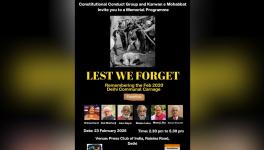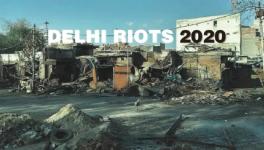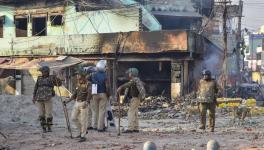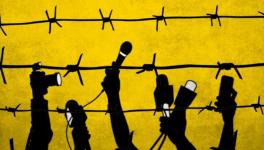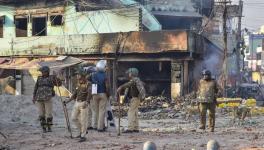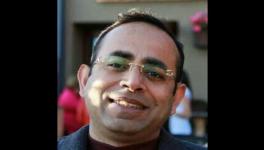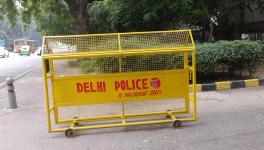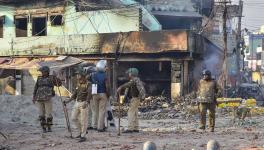Delhi Riots: Echoes of 1984 and a Silver Lining
A lot has already been said and written on the communal violence in North- East Delhi. All of us have read about what has happened, speculated on likely perpetrators and even heard of first-hand experiences of reporters on the ground who have been reporting since the day the violence began.
However, I still felt the need to share my experience. I went to the riot-affected areas when, it was said, the worst was over. I was there on Day 4, (February 26) my first stop being Maujpur-Babarpur. As I got out of the Metro station I saw closed shops, roads covered in broken glass with goods from the burnt shops thrown on the roadside. There was police patrolling with a curfew in place, along with a shoot-at-sight order. Even though I’ve lived in Delhi all my life, I had never been to these parts. I’d been happy in my own ‘Delhi’. Now, I wondered where to head to.
I saw two men standing next to a burnt and broken Dental clinic. I approached them and they started talking about how the violence happened and how it escalated. They did not know who the rioters were but wondered if they were specially hired for this purpose. They said that on the first day, when there were only stray incidents of stone pelting and that no one had expected the violence to go out of hand. They claimed they had lost one of their own in the firing and now feared for the lives of their loved ones. They said they were out there keeping a vigil – standing guard to stop any group that could mount an attack. I could also see groups of people emerging from the lane, leaving their hopes for a safer place, bag and baggage in hand. They said the environment was not conducive to live in anymore. I was escorted around the area to be shown how people are protecting Hindu families and a temple, as they did not want to hurt each other.
The area of Kardampuri also bore a deserted look, save for a group of people keeping an eye on miscreants who could return to re-create the same havoc from a day earlier. Here, however, people were more vocal about political leaders and their hate speeches. They felt that the speeches were provocative and thus responsible for instigating violence. Protests against the Citizenship (Amendment) Act, 2019, had been ongoing for two months. Why did the violence happen now, they asked.
An entire scrap market was gutted in Gokulpuri. The areas of Yamuna Vihar, Chand Bagh and Mustafabad were no better – there was devastation everywhere.
I was informed that a mosque had been vandalised and burnt in Ashok Nagar. It seemed hardly believable but when I reached the area it was clear that this was not a rumour; for, there stood the mosque, burnt down and broken with a Hindu temple flag on one of it’s minarets. I wondered why any Hindu would do it. What could have possibly been motivation enough?
The shops around the mosque were gutted, along with four houses that belonged to Muslims. They were ransacked completely, not even the water taps were spared. I could not take it in and hoped that this nightmare would be over soon when my eyes met with those of a young boy, standing with his mother outside what had been their home. There was nothing to salvage. Tears and horror in his eyes, he held on to her hand. There was fear too, a sense that everyone around him would kill him. Would he ever recover from this trauma? Would he forget what happened here and ever be able lead a normal life?
I left, wondering where all the camaraderie went, where all this hatred had come from. Was it always there, peeking from under the surface? Which religion teaches cruelty?
My next stop was the GTB Hospital where the wounded and dead were still coming in. The number of the dead had been increasing daily. The place was full of grieving families. A group of young lawyers were trying to collect information, members of the media were trying to talk to people who had lost their loved ones. They, in turn, were waiting to get their bodies back in order to give them a proper farewell.
Civil society organizations and common folk were also there, offering help in any possible way.
This should not have happened; all it needed was timely government action which would have put an end to all this madness immediately.
I went there again on the 6th day. Most of the shops were still closed and people were out in their lanes, trying to clean debris and remnants of the violence, trying to return to a semblance of normalcy. I was watching, trying to talk to people when suddenly a group of about 10-15 very aggressive men surrounded me. Two of them were on a bike and stared at me with anger and rage. They kept asking me why I was there. I informed them that I just wanted to talk to people and ask them about how things were, especially for those whose houses had been burnt. This made them angrier. They questioned my motives, asking me why I was reporting on one side and not the other. I tried telling them that I had come there with the hope of telling a story about how neighbours were helping out those affected. The angry men refused to believe me, and kept asking me if I was Hindu. I started wondering what I could say or show them that would calm them down. However, I got intimidated by them and let them push me out of the area; I did not do anything.
The anger the men had towards me and their neighbours of decades, shook me. I was reminded of the 1984 riots. Even back then, neighbours had become wary of each other. Similar seeds of distrust had been planted again.
As they say though, there was light at the end of the tunnel. In Maujpur, I met a group of people helping victims with food, shelter and cash. One of them said that he had lost his father during the 1984 riots and that he had seen enough devastation. He said he did not want it to happen to anyone. “In the case of an emergency, its not God but your neighbour who can get to you first,” he said.
Get the latest reports & analysis with people's perspective on Protests, movements & deep analytical videos, discussions of the current affairs in your Telegram app. Subscribe to NewsClick's Telegram channel & get Real-Time updates on stories, as they get published on our website.









